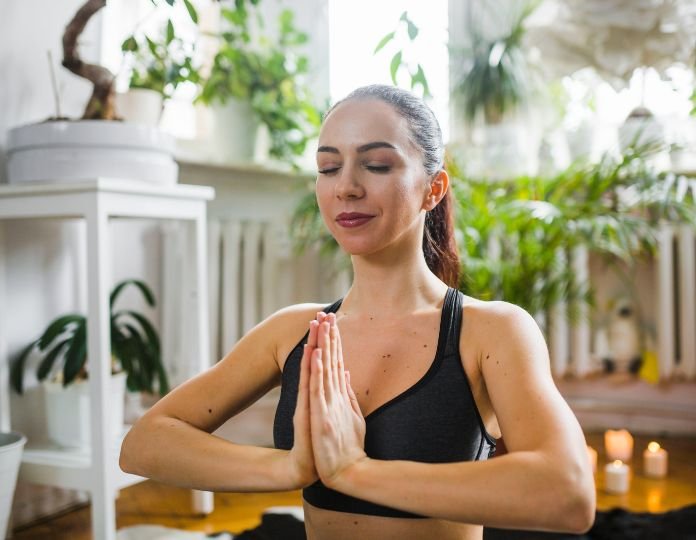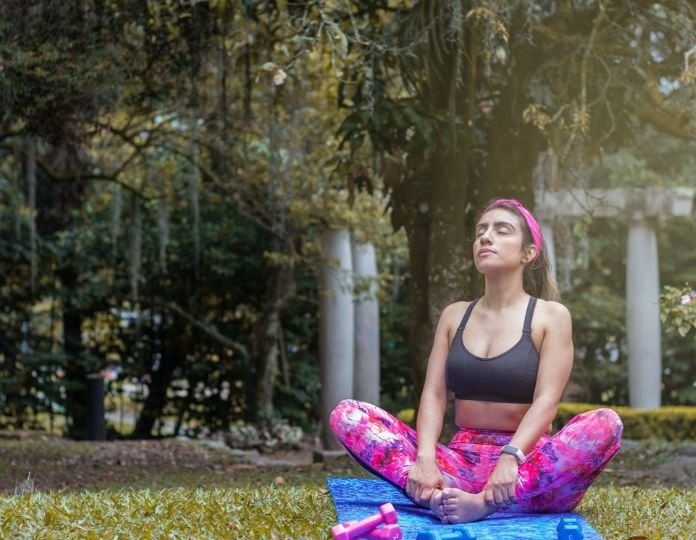Our mental health is as important as our physical health. A statement repeatedly reminded to us by psychologists, medical professionals and media. Consider your mind as a hyperactive, overstimulated DJ at a never-ending party, mixing records and managing requests from all sides. It’s loud and disorganised, and ultimately the DJ starts messing up, repeating the same nervous thought or exaggerating the incorrect feelings. Imagine your body on the dance floor, swaying to the music the DJ is playing. At times, it will pick up speed and become enthusiastic, while other times it will slow down to a standstill. So, where is the balance? The party’s dance instructor and bouncer are mind-body techniques.
The term “mind-body practices” describes a range of methods intended to strengthen the beneficial influence of the mind on the body and vice versa. Exercises like yoga, meditation, tai chi, mindfulness, and breathing techniques are examples of mind-body techniques. Primary Goal: Assist with stress reduction, enhance emotional control, and advance physical well-being by coordinating mental and bodily states.
Read More: The Depths of Indian Psychology: Traditions and Modern Insights
What is the history behind this?
The origins of mind-body techniques can be traced back to ancient philosophical and spiritual traditions. Meditation and other practices like yoga date back to approximately 3000 BCE in India. Patanjali’s Yoga Sutras established yoga circa 200 BCE. Through physical postures, breath control, and meditation, these practices sought to bring the mind, body, and spirit together. Similarly, the practices of Tai Chi and Qigong emerged in China during this same period, stressing balance and the cultivation of vital energy (Qi) for health and spiritual harmony. Meditation also played a central role in both Hindu and Buddhist traditions, emphasising mindfulness and enlightenment.
When psychology started examining the link between mental and physical health in the 19th and 20th centuries, mind-body techniques began to make their way into Western medicine. In the West, yoga and meditation became more and more popular by the 1960s and 1970s, particularly among the countercultural groups. Dr Jon Kabat-Zinn brought mindfulness.
These days, a lot of contemporary therapy techniques use these activities, highlighting how beneficial they are for stress and anxiety management as well as for enhancing general mental and physical health. Their historical trip illustrates how people from all cultures and eras have always understood the profound connection between the mind and body.
Read More: Yoga: A Path to Psychological Well-Being
But What is the Need?
A wide variety of techniques are included in mind-body activities, such as Tai Chi and Qigong, Yoga, Mindfulness and Meditation, Breathwork (Pranayama), etc. The parasympathetic nerve system, sometimes known as the “rest and digest” system, is triggered by yoga and meditation, which lowers cortisol levels—the stress hormone—and lowers the body’s general level of arousal.

Research has demonstrated that practising mindfulness meditation can alter the structure of the brain, especially in the areas of the prefrontal cortex and amygdala that control emotions and process fear. According to studies, mind-body techniques can increase the release of endorphins and oxytocin, also known as the “feel-good” hormone, which in turn promotes emotional health.
Deep breathing exercises and meditation are beneficial because they increase the production of GABA, a neurotransmitter that calms the mind and lessens anxiety. Rumination is a primary cause of depression, but meditation, and more especially mindfulness practices, help minimise it by promoting present-moment awareness and distancing oneself from negative ideas. Consequently, plenty of research has demonstrated its efficacy in mitigating anxiety and depression, enhancing the effects of conventional depression treatments, enhancing attention, memory, and executive function, and fostering increased emotional resilience.
According to Clinical Psychologist Shourya Gupta, Yoga and Meditation are practices that can help create harmony between the mind and the body. They can bring many positive impacts on your mental health, such as enhancing your cognitive functions, boosting your attention and concentration, boosting your mood by releasing helpful brain chemicals like dopamine, serotonin, and norepinephrine, reducing depression, stress and anxiety, promoting better sleep and enhancing self-awareness. When you do these mind-body practices, your brain cells develop new connections, and changes occur in brain structure as well as function, resulting in improved cognitive skills such as learning and memory. They strengthen parts of the brain that play a key role in memory, attention, awareness, thought, and language. They also help with numerous physical health issues, which in turn support our mental well-being.
Read More: Defining spirituality In our life
Can We Do It Too?
Yes! This is a quick and easy mind-body method that can help you feel less stressed and anxious in a matter of minutes. Here’s how to accomplish it:
- Step 1: Sit comfortably with your back straight.
- Step 2: Close your eyes and breathe quietly through your nose for 4 seconds.
- Step 3: Hold your breath for a count of 7 seconds.
- Step 4: Exhale completely through your mouth for a count of 8 seconds.
- Step 5: Repeat this cycle four times.
You can practise mindfulness, which centres you in the here and now, reduces tension, and fosters calm, by concentrating on your breathing. Additionally, it activates the emotional regions of your brain, which enhances emotional control and lessens anxiety.
Read More: 7 Tips to help you Meditate effectively Everyday
By Focusing on Mental Health
In modern mental health care, mind-body techniques are being employed more and more in addition to conventional therapies like medication and psychotherapy. In order to improve emotional regulation and lessen the symptoms of anxiety and depression, mindfulness-based stress reduction (MBSR) and mindfulness-based cognitive therapy (MBCT) are commonly paired with traditional cognitive behavioural therapy (CBT). Studies show that practising yoga and meditation can lessen the negative effects of several drugs by boosting mental and physical well-being, lowering stress levels, and increasing general physical health.
In contrast to conventional mental health therapies, which frequently call for expensive medications, specialised facilities, or professional supervision, mind-body techniques are generally inexpensive, portable, and require little to no equipment for use. People with chronic illnesses or physical restrictions can modify many mind-body practices. For example, chair yoga eliminates the need for rigorous physical activity while yet providing the mental health benefits of yoga to people with restricted mobility.

Because mindfulness and yoga are mind-body activities that have positive effects on mental health, it is becoming more and more common to include them in businesses and schools. Studies reveal that pupils who practise mindfulness have enhanced focus duration, enhanced emotional control, and reduced stress and anxiety. Businesses are adding more and more yoga and mindfulness exercises to their corporate wellness initiatives to boost worker happiness, lessen staff burnout, and promote mental health in general.
According to Psychologist Tapas Dasmohapatra, The simple structure you can adopt to use mind-body techniques is through five senses.
- For ‘See’ you can use the 20-20 technique; where in every 20 minutes you get up from your chair, get into an open space and look at something 20 feet away.
- For ‘Smell’ lavender and lemongrass have been proven to create a calming effect.
- For ‘Touch’ a shower can have a required effect on your mind. Both cold and hot showers are effective as per your need.
- For ‘Hear’ you can use white noise to soothe anxiety or music of your choice to uplift your mood and sharpen your focus. 777 Hz sound frequency is often used to heal and bring positivity.
- For ‘Taste’ you can try an anti-inflammatory diet or herbs to lower your cortisol levels.
Based on the five senses you can custom-create a basket of result-oriented mind-body techniques that works for you. Generally, yoga, pranayam, walking and reverse walking also have been fruitful along with CBT.
Mind-body techniques and professional care should be combined for those with severe mental health conditions as these practices may not be effective for everyone. Furthermore, incorporating these techniques into daily life calls for dedication and self-control, which can be challenging in hectic settings. Mind-body techniques are used in contemporary mental health treatment to help people develop resilience and mental and physical equilibrium.
References +
Burnett-Zeigler, I., Schuette, S., Victorson, D., & Wisner, K. L. (2016). Mind–Body Approaches to Treating Mental Health Symptoms Among Disadvantaged Populations: A Comprehensive Review. Journal of Alternative and Complementary Medicine, 22(2), 115–124. https://doi.org/10.1089/acm.2015.0038
https://www.cancer.gov/publications/dictionaries/cancer-terms/def/mind-body-practice. (2011, February 2). Www.cancer.gov. https://www.cancer.gov/publications/dictionaries/cancer-terms/def/mind-body-practice
Lele, T. (2024, April 18). India’s ancient tradition that aligns mind, body and spirit – and where to experience it. Www.bbc.com. https://www.bbc.com/travel/article/20240417-ayurveda-indias-ancient-tradition-that-aligns-mind-body-and-spirit
Mind-body medicine Information | Mount Sinai – New York. (n.d.). Mount Sinai Health System. https://www.mountsinai.org/health-library/treatment/mind-body-medicine
Mind-Body Therapies for Improving Mental Health — Seattle Psychiatrist. (2023, October 17). Seattle Anxiety Specialists, PLLC. https://seattleanxiety.com/psychiatrist/2023/10/17/mind-body-therapies-for-improving-mental-health
Types of Mind Body Practice | Renaissance School of Medicine at Stony Brook University. (2018). Stonybrookmedicine.edu. https://renaissance.stonybrookmedicine.edu/prevmed/wellness/mindbodyresources/typesofmbp













Leave feedback about this